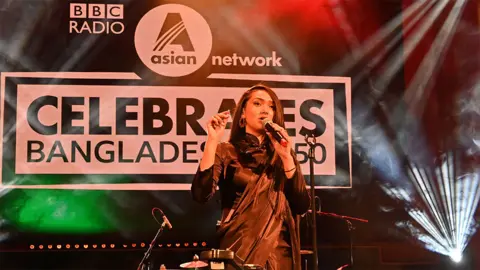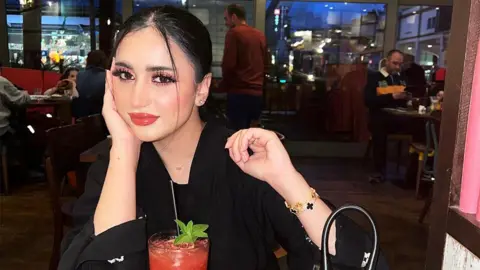Asian Network turns 20: 'A safe space for British Asians'
 BBC
BBCWhen BBC Asian Network went national 20 years ago today, it was described as being "a one-stop shop for Asian communities".
It has provided a platform for young British Asian music talents, while welcoming big-name guests such as Shah Rukh Khan, Alia Bhatt, Ranbir Kapoor and Deepika Padukone.
For many British Asians, the station has provided "a safe space" to go to, whether that's to listen to music or hear topical cultural issues being discussed.
"It's like the cool, safe and secure place, and almost comforting, knowing that the Asian Network is there 24/7," says fan Vishma Rai.
"And I don't think you can say that about anyone, even your friends," she tells BBC Newsbeat.
Platform and representation
"I'm an opinionated young woman now. And I never was that person, I was so shy as a child," says 27-year-old Vishma from Bristol.
She has been a listener for over 10 years and praises the station for the "positive impact" it's had on her through its wide-ranging discussions.
"I didn't allow myself to even have an opinion. But Asian Network showed me that's not the norm, and it opened my eyes."
 Vishma Rai
Vishma RaiWhile providing a platform for discussion, the station is known for being a champion of up-and-coming British Asian music talents.
One of those who has been played on the station regularly over the years is producer and musician Naughty Boy, who says hearing artists such as Jay Sean, Rishi Rich and Bally Sagoo had a profound impact on his own career.
"It made me think that anything's possible as a British Asian artist. Before I started, these people were paving the way.
"Asian Network has played a huge part in the trajectory of my career, from the get-go."
'Forever grateful'
He says he will be "forever grateful" for the support he's received and hearing his music on the station is "a feeling that will never get old".
Naughty Boy notes there is a power in Asian Network, "especially when you want to crossover".
Joy Crookes and Priya Ragu are two artists he names as starting out and being pushed by Asian Network, and they are now popular artists in the mainstream.
"A great example of how you can be championed by one particular station but then go on to take over the world."

And while he might be an established name now, Naughty Boy "loves hearing and seeing new voices".
One of those new talents is D8, who will be performing at Asian Network Certified in Birmingham, to celebrate 20 years of the station.
"They picked up on me really quickly and started playing my stuff," he says.
"They pushed my music to an audience I wouldn't have been able to myself and I would not be where I am today without them."
He says it's a special feeling because "it was the only radio station that my mum and my dad, my uncles, and family used to listen to".
 Instagram/officiald8_
Instagram/officiald8_D8 feels Asian talent can sometimes get "brushed under the carpet" because of how rare it can be to see Asians in mainstream music.
"But with me, I feel I hit the jackpot with Asian Network. I was picked up and pushed into the charts."
'The first place to go to'
For Breakfast Show presenter Nikita Kanda, "family and community" is what comes to mind when thinking about Asian Network.
"I really do feel like I spend more time here than with my actual family. It's somewhere you can call your own, especially for us British Asians."
Growing up, the 27-year-old listened to the likes of Noreen Khan and Bobby Friction, and says it's now surreal to call them colleagues.
"So professionally, and personally, it's been a big part of my life."
Rishi Sunak became the first British Asian prime minister in the UK, and Nikita says hearing news like that "makes the first place you want to go" be Asian Network.
"You want to hear what we're saying about it, because it's that feeling being there when you do hear news about ourselves."
Working in the media or entertainment industry is not a typical path for Asians, Nikita says, which is why it's important for the station to "inspire the next generation" of presenters and artists.

Nikita started her weekend show during the Covid pandemic and says she felt the "responsibility as a presenter because radio is an escapism".
"If you're having a bad morning or a bad day, and you turn on the radio, you just want to hear good music, light hearted chat, just a bit of fun."
Vishma agrees and feels during tough times the station has acted as a connection to the Asian community.
She says it was an "emotional support system".
"Everyone felt like they were in jail, it affects you. In times like that you really are in a time of need to have your mood lifted."
"They've always got some lively tracks to play to lighten up the mood to make you feel like everything's OK," she adds.


